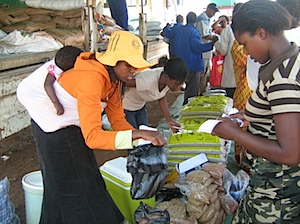- “Food is the most cost-effective intervention.”
- Peru promotes potatoes.
- The Importance of Biodiversity to Medicine. Anyone got access? Any mention of nutrition?
- EU Says bees should rest. Problem solved.
- Extreme beer. All problems solved.
- Eat local? I don’t think so.
- Itchy Italian gourmands gutted over climate change-caused truffle troubles.
- Mulberry trees pay the price for immodesty.
- While fig trees planted by Jesuits survive. It’s a funny old world. Fruit tree trifecta in play.
- And it comes in! Today’s saving-the-frigging-English-apple story comes to you from The Guardian. Enough already, the English apple is going to be fine.
Book of the agrobiodiversity of Guatemala published
My good friend Cesar Azurdia has alerted me to the publication of the book Guatemala y su Biodiversidad. Chapter 9 focuses on agricultural biodiversity. There’s a lot of great stuff on homegardens, crop wild relatives, effects of climate change etc., all subjects very dear to our heart here.
Input fairs: the view from the ground
One of the FAO’s preferred responses to food emergencies is the Input Trade Fair. Farmers receive a voucher, which they can exchange for seeds and other inputs that they need for a better harvest. In 2007, for example, 20,000 government-selected families in central and eastern Swaziland received vouchers that they could spend at one of 25 Input Trade Fairs. Earlier this year, FAO described these fairs as “winners”. But as the 2008 planting season gets under way, the news from Mbabane is not good.
 A report carried by IPS says that Swazi Input Fairs [are] Falling Short. Far fewer farmers have received vouchers this season. In the wake of rising prices the vouchers are not enough to purchase all the inputs needed. More vendors have entered the market, cutting down on sales for existing vendors. But most worrying of all, according to the report most of the subsistence farmers who have benefited from the scheme are no nearer being able to stand on their own feet than they were before the scheme started. Some, it is said, have no real interest in farming. They are just hungry, and wash the pesticidal dressings off the seeds before cooking and eating them. Many farmers refuse to switch away from maize, which needs far more water than crops such as sorghum.
A report carried by IPS says that Swazi Input Fairs [are] Falling Short. Far fewer farmers have received vouchers this season. In the wake of rising prices the vouchers are not enough to purchase all the inputs needed. More vendors have entered the market, cutting down on sales for existing vendors. But most worrying of all, according to the report most of the subsistence farmers who have benefited from the scheme are no nearer being able to stand on their own feet than they were before the scheme started. Some, it is said, have no real interest in farming. They are just hungry, and wash the pesticidal dressings off the seeds before cooking and eating them. Many farmers refuse to switch away from maize, which needs far more water than crops such as sorghum.
While an on-the-spot report such as this one offers some insights, it does not indicate how Swaziland’s drought-stricken farmers could best tackle their problems. Maybe they need more extension help, to show them how to make better use of their inputs. Maybe they need radical changes in their methods. I was at a meeting in London on Wednesday where I saw a very short video called Greening the Desert. Geoff Lawton, of the Permaculture Research Institute of Australia, explained in tantalizing snippets how he had transformed a barren patch of Jordan into a flourishing orchard. No, I have not seen peer-reviewed results. But it seems worth trying elsewhere, and Swaziland could be a good place to do so.
Climate Change Gabfest
Our colleagues at the Agrobiodiversity Platform will next week launch an intense debate on how communities make use of agricultural biodiversity to deal with changing climates. But, mindful of their duty not to exacerbate the problem, they’re doing the whole thing online, with a moderated discussion forum. The discussions will take place over about three weeks, with an initial focus on sharing knowledge about what communities are doing, followed by ideas on awareness raising and finally some wrap-up and the preparation of a first-draft position paper.
I know I don’t have time to participate, but I’m sure we’d be willing to host summary reports from the group here.
Nibbles: Coffea, Tequila, Livestock wild relatives, Rice wine, Vit. D, Statistics
- Wild coffee studied; report from Madagascar.
- Adding value to tequila. Lots of value.
- Vietnamese farmers go wild.
- Vietnamese farmers get drunk.
- All about Vitamin D.
- “…cranberries are the neglected stepchild of the season.”
- What does that make the turkey?
- Gates Foundation moves into space. Via.